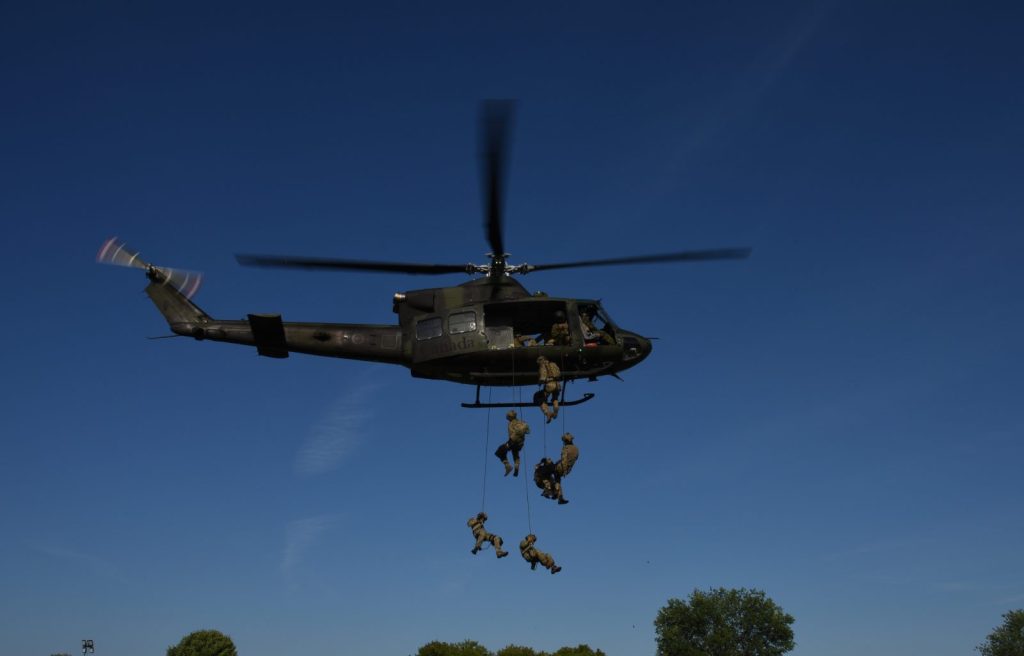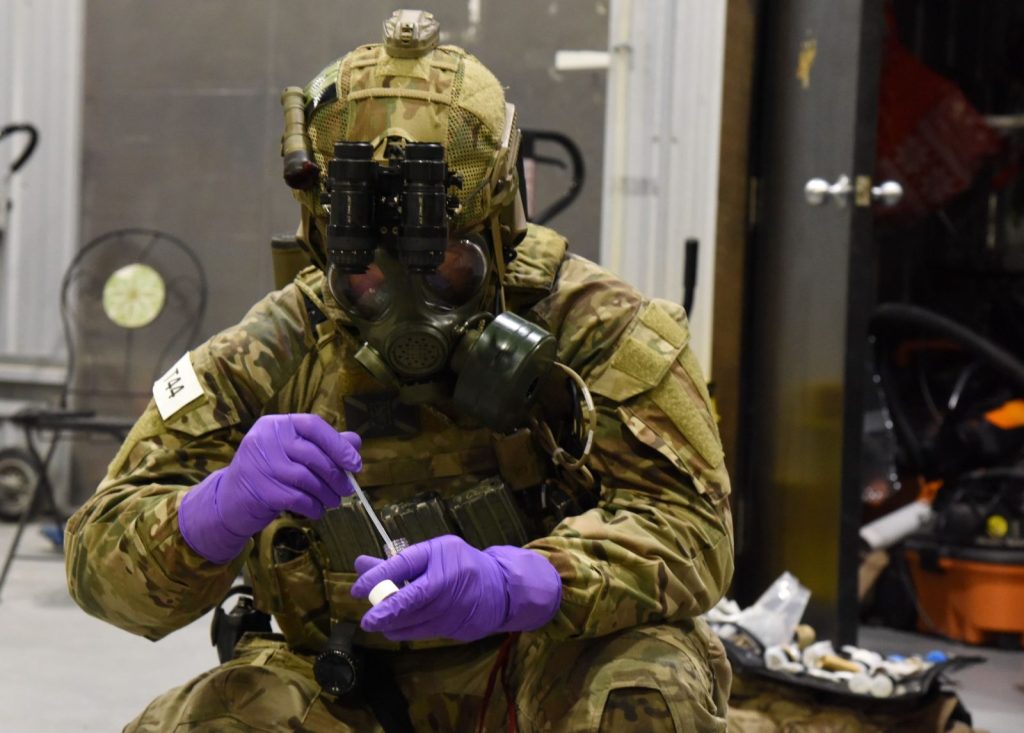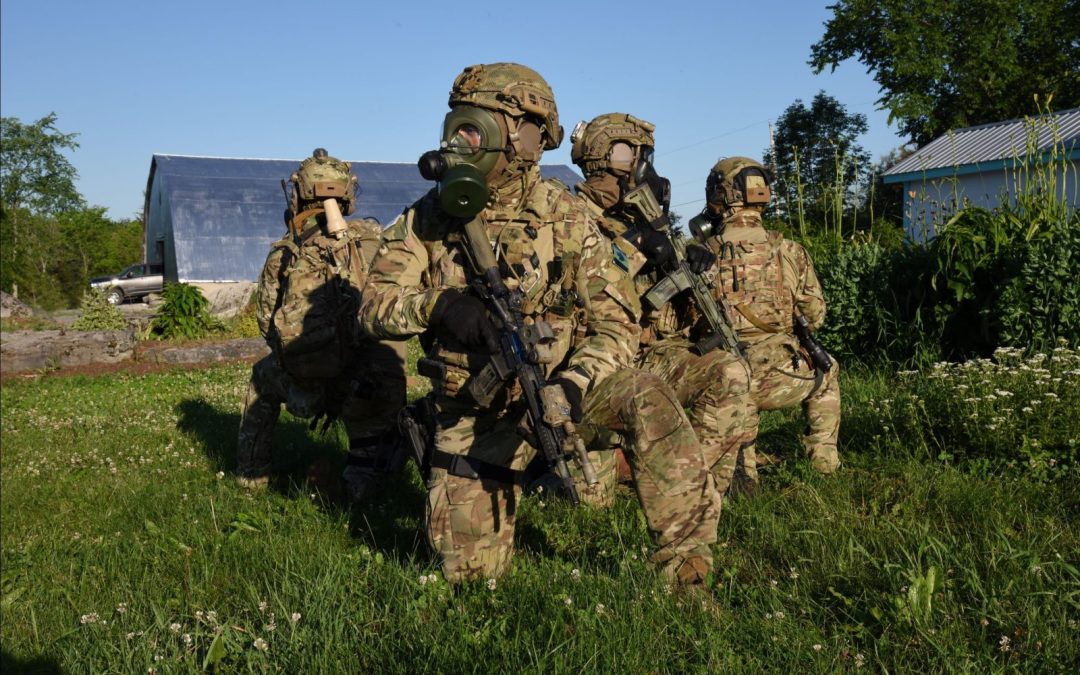by Chris Thatcher
If you’ve ever wondered what S.W.A.T, CSI, NCIS, and Code Black might look like all rolled into one, meet the Canadian Joint Incident Response Unit (CJIRU). Part special forces operators, part forensic scientists, part police detectives, and part medical response specialists, the unit provides an agile and rapid response for detecting, identifying, and mitigating chemical, biological, radiological, and nuclear (CBRN) risks in support of special operations missions.
“We ask a lot of our people,” acknowledge commanding officer Lieutenant-Colonel Geoff Mundy. “We are very fortunate that we attract such high-quality candidates, and we are able to retain such highly motivated people.”
At a time when the Canadian Armed Forces (CAF) is pulling out all the stops to retain talent, organizations like CJIRU offer those with the right stuff a unique unit in which to further their education while still serving as operators under demanding conditions.
“CJIRU is composed of tactical proficient technical experts who can address very complex threats presented by [CBRN] agents with the use of leading-edge technology and deep academic knowledge,” said Mundy, a former infantry officer who has served with Canadian Special Operations Forces Command (CANSOFCOM) for much of the past 15 years.
The unit has its roots in the Royal Canadian Mounted Police (RCMP) Nuclear, Biological Chemical Defence Response Team, formed with the assistance of a CAF cadre at CFB Borden in the 1970s. After September 11, 2001, the CAF created its own Joint Nuclear Biological Chemical Defence company in 2002. Four years later, in 2006, the company became a part of the nascent CANSOFCOM and was renamed CJIRU.
Its primary mandate is to detect, identify, characterize, and mitigate CBRN hazards through sampling and identification, decontamination of people or equipment, and surveillance to determine where the hazardous agent is in a contaminated environment. Or, in layman’s terms, figuring out what the hazard is “because the insidious thing about CBRN is that you can’t smell, see, hear or feel what it is,” Mundy explained.
CJIRU has also developed the ability to conduct sample analysis to “an evidentiary standard” to help attribute the sponsor of an attack in support of its continued role with the RCMP and other government agencies like the Public Health Agency of Canada (PHAC). It can provide advanced laboratory techniques for processing and analyzing collected materials for intelligence assessments, and hazard modelling using specialized software. Finally, members are trained to deliver battlefield casualty extraction and CBRN medical treatment in and from contaminated environments.
Not surprisingly, CJIRU is selective about who gets in. Many apply for its assessment phase, known as selection, but only some survive the gruelling one-week test each spring.
“A lot of our tasks and missions are done in small teams, where low ranks – corporals and master corporals – are leading teams out the door, and we need to have trust in individuals,” said Derek, a warrant officer who leads the unit’s recruitment. (Operator last names are being omitted for operational security reasons.) “We’re very particular on their maturity and how they work in a team before we train them on all the other things they need to know.”

Applicants to CJIRU are screened, primarily for medical reasons, before the selection assessment, but most are invited to attend a trial that demands everything of candidates, physically and mentally. Only the resilient advance.
“You will not know what’s coming,” Derek emphasized. “Your days will be full of tasks, and you’ll be evaluated at all times, but you will not know what you’re evaluated for. The purpose of the assessment phase is to determine your probability of success on the course that follows. “
His advice? Trust the process. “Because you don’t know what’s coming, you are in the dark the entire time you’re being evaluated, with zero feedback. You may think you’re doing poorly, but you don’t know on what, and some will voluntarily release from the selection. My advice to anyone: Finish the selection no matter how you feel about your own performance. Let the assessors do their job and let the process decide if you’re a fit for the unit or not. If you’re putting in the work to get yourself on a selection, finish it.”
Josh, a corporal and relatively recent candidate for CJIRU, agreed. “If you are thinking of trying out, go for it,” he said. Even failure can have its reward and perhaps a second chance. Though he was aware of how little he understood about what evaluators were expecting of him, “I think my head was so focused on my goal of finishing that to me the option to quit wasn’t there.”
For those candidates who measure up, the next phase is an approximately 10-month course that includes a tactical component covering skillsets like shooting, tactical driving, close quarter battle, and moving in an urban environment; a technical component on decontamination and how to scale it to various scenarios; and formal university-level education in chemistry, biology and nuclear physics at the Royal Military College (RMC) in Kingston. Those three tactical, technical and knowledge components are then brought together in a series of exercises known as the “green” phase.
“It was definitely long at times and fairly fast paced,” said Josh, who was attracted to CJIRU by the higher educational opportunities while maintaining soldier skills. “There is not a lot of down time in those 10 months. It all culminates on a final exercise, which is a test of all the skills you have learned.”
While his infantry background helped with certain aspects of the course, all trades can succeed, he said. “Regardless of what you have learned in your previous trade, you are going to find a niche somewhere in those 10 months where you can be a benefit to your course mates or have expertise where others don’t.”
One reason for the demanding selection? “There isn’t a lot of failures on the operator course,” Derek observed. “The selection process is rigorous. No one’s going to want to do that twice. So, if you’re successful, you’re going to want to be successful on the course.”

One of the core strengths of SOF units is the empowerment of being surrounded by likeminded, highly motivated operators, he added. “Everybody went through what you went through to be here, and everyone will then help each other to get through the course.”
The introductory course is only the first major step in a career of continuous learning. “Our high readiness responsibility means that our people can’t afford to let their skills fade, they need to keep them up to date,” said Mundy.
That means a constant repetition of tactical, technical, and academic training, testing the ability of operators “to problem-solve in a scientific setting,” he said. CJIRU maintains a close working relationship with Defence R&D Canada research centres in Suffield and Valcartier, with the PHAC national microbial lab in Winnipeg, and with other academic institutions. “Corporals and master corporals have professional linkages and relationships with scientists at those organizations that develop over time. If they are presented with a problem they can’t solve, they can reach back to those scientists to provide specialist support.”
And because operators are frequently deployed as part of CANSOFCOM overseas missions, the feedback loop from operations to training is fast, noted Derek. “It’s all operators training operators.”
If the nature of the work suggests the need for a background in science, technology, engineering and math, Mundy is quick to counter that notion. “A STEM background may give you benefits, but it’s not necessary. We will give any applicant the education and training they need to operate at an extremely high level.”
CJIRU casts the recruiting net as wide as possible, he noted. While a majority of candidates come from combat arms trades, there is no particular branch or cap badge preference. “Everything you need to know will be taught on the CBRN operator course. It all comes down to your ability and willingness to learn,” said Derek.
“We look for people who are open to new experiences, who aren’t constrained in their thinking, who are humble, and who are committed to professional growth,” Mundy emphasized. “And people who are physically fit. The job is incredibly physically demanding ff you think of trying to work in protective equipment while still maintaining a high level of situational awareness.”
Mundy, Derek and Josh all stressed attributes such as determination, emotional stability, conscientiousness, humility, and being intrinsically motivated. “We want self-starters and people who are interested in how things work and how to solve difficult problems under the most demanding circumstances,” said Mundy.
Like all SOF organizations, “we believe that operational effectiveness is derived from the personality traits and attributes of our membership. It is the people who matter the most.”
For operational security reasons, there are limits to what can be shared about the job with family. CJIRU has family support programs and Mundy recognized how much is asked of family members. Derek urged any applicant considering CJIRU “to make sure you’re very open about what the job requirements are going to be. Due to being a high readiness unit that can be out the door on short notice, it’s not just you that has to be ready; the home front needs to be ready.”


I’m so happy CJIRU is getting more recognition, hands down one of my favourite SOF units right beside some SMUs or civvie 3rd options
I still remember stumbling upon the Legion Magazine article “The Dragon Hunters” put out a long time ago and the subsequent articles concerning Iraq and the poisoned letter sent to then-president Trump amongst many other mentions concerning CBRN training and absolutely falling in love with them, made a promise to myself then that I would earn the right to wear the black dragon alongside a red cross when I became old enough
After a couple hiccups, and my application with the CAF finally seeming to move forward again I’m nothing but excited to embrace the suck and prove myself to them that I can earn the right to honor that promise
Thank you for your kind words. I was in this unit for 7 years, best 7 year of my 27 year Military career
just an Awesome unit always the best.
Randy
Thank you Randy. Always great to have positive feed back. Much appreciated